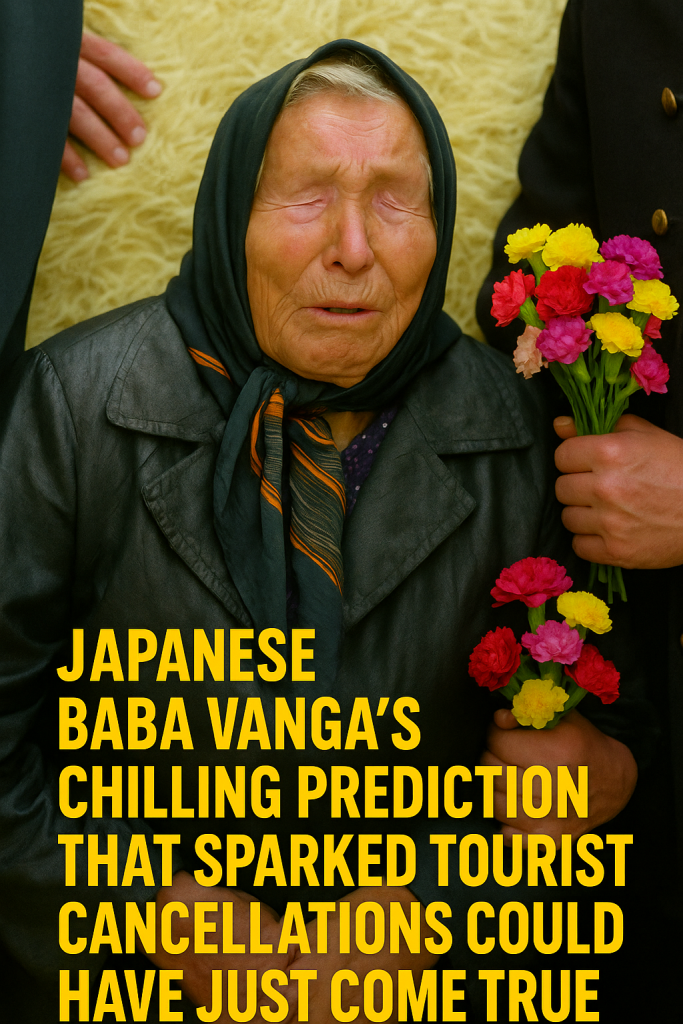In an unexpected turn of events, a chilling prediction attributed to Japan’s so-called “Baba Vanga” has seemingly materialized two days ahead of schedule, igniting widespread concern and causing a wave of tourist cancellations across the country.
For months, a haunting prophecy linked to a mysterious figure often dubbed the Japanese Baba Vanga — referencing the famed Bulgarian prophetess known for eerily accurate forecasts — has circulated on social media and travel forums. This prediction ominously warned of a catastrophic event striking Japan in early 2024, leading many travelers to rethink their plans and drastically impacting the tourism sector.
Originally, the prophecy pointed to a significant disaster occurring around mid-June 2024. Yet, recent intelligence from meteorological reports, seismic activity logs, and government alerts indicate that related unsettling events have already begun unfolding slightly ahead of the predicted timeline. The premature manifestation of this prophecy has only fueled apprehensions and intensified cancellations by both international visitors and domestic travelers.
The Emergence of the Japanese Baba Vanga Phenomenon
The identity behind the “Japanese Baba Vanga” remains ambiguous, but the figure has gained notoriety through viral posts proclaiming bafflingly accurate foresight into major calamities and cultural shifts. Her—or their—latest prediction pointed towards natural disasters, possibly tied to earthquakes or typhoons, that would ravage certain regions of Japan, critically disrupting life and tourism.
This prophecy sparked an immediate reaction from the travel community. Agencies began reporting a noticeable drop in reservations, and some airlines flagged routes to affected Japanese cities. Popular tourist destinations, known for their cultural heritage and natural beauty, have seen a sudden decline in visitors, impacting local economies dependent on foreign tourism.
Tourism Industry Faces New Challenges Amid Growing Unease
Japan’s tourism industry, still rebounding from the global pandemic slump, now faces an added layer of complexity. Hoteliers, tour operators, and local businesses express worry that the fear driven by this prophecy will prolong recovery efforts.
Industry insiders suggest that while natural disasters have always been a risk for visitors, the psychological impact of a viral prophecy has amplified concerns far beyond usual caution. Travel advisories remain standard, emphasizing safety and preparedness, but the “prophecy effect” has yielded a unique social phenomenon where superstition heavily influences travel behavior.
“We’ve never seen something like this before — a prediction causing genuine economic impact because people are scared it might come true,” commented a tourism analyst. “The early emergence of the signs linked to the prophecy only reinforces this fear.”
Authorities Respond with Reassurances and Precautionary Measures
Japanese government agencies and meteorological experts have urged calm, emphasizing ongoing monitoring and preparedness for natural events common to the region. Enhanced warning systems and community preparedness drills have been highlighted as proactive steps to ensure public safety.
Experts caution that while the early signs may coincide with elements of the prophecy, natural phenomena such as earthquakes and typhoons are part of Japan’s environmental reality. They encourage visitors to stay informed through official channels and avoid undue panic driven by unverified predictions.
The Global Ripple Effect of a Viral Prophecy
The spread of this chilling Japanese Baba Vanga prediction illustrates how modern technology accelerates the reach of folklore and prophecy, blending cultural mysticism with tangible economic consequences. Social media platforms, forums, and messaging apps have amplified anxieties, showing the powerful nexus between belief and behavior in the digital age.
As Japan continues to brace for uncertainty, the intersection of prophecy and reality remains a captivating story —



